高教版公共英语3级精讲班讲义8
公共英语三级PETS3级听力讲义

全国英语等级考试(三级)PETS-3听力精讲新世纪教育公共英语三级(pets3)包过 q17951073主讲人:张志健目录一、题型概述二、A 节短对话三、B节长对话、短文四、复习指导一、题型概述听力部分大纲要求与考查点大纲要求考查点理解主旨要义;考查对文章大意和中心思想的理解能力;获取事实性的具体信息;考查从听力材料中获取事实细节的能力;理解明确表达的概念性含义;考查根据听力材料内容提炼并理解概念、定义等的能力;进行有关的判断、推理和引申;考查在理解听力材料的基础上,对说话人的身份、职业、与对话人的关系、事件发生的地点和时间等进行判断、推理和引申的能力;理解说话者的意图、观点或态度。
考查分析说话者措辞、语气和语调,推断说话者的意图、观点或者态度的能力。
⏹题目数量15道题,4段长对话或者短文⏹篇幅时间总长800词,每段平均约200词,持续8'30″⏹所占分值15分⏹答题要求每题有15秒答题时间(5秒用作听前读题,10秒用作听后答题)。
每段录音材料只播一遍。
Section IListening☐题目数量10道题,10段短对话☐篇幅时间总长400词左右,约3'30″☐所占分值10分☐答题要求每题有15秒答题时间(5秒用作听前读题,10秒用作听后答题)。
每段录音材料只播一遍。
A 节短对话B 节长对话、短文二、A节短对话提问方式通常为以What, When, Where, Why, Who,How等开头的特殊疑问句,如:What is the woman doing at the moment?When will the bank open on Sundays?Where is the man`s house located?Why is the woman angry with her son?How does the man feel about his grade?问题类型是什么?什么时间?什么地点?谁?什么原因?什么态度?……行为内容题(what)、时间数字题(when)、场所地点题(where)、职业身份题(who)、原因动机题(why)、态度立场题(how)短对话的“潜规则”1. 推理原则一般情况需要对对话进行推理,因此在短对话中,“所听非所得”。
成人教育英语三级考试精讲班讲义08
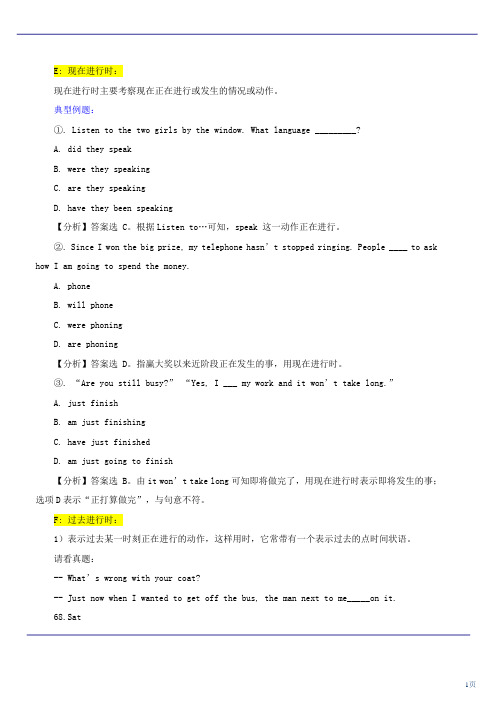
E: 现在进行时:现在进行时主要考察现在正在进行或发生的情况或动作。
典型例题:①. Listen to the two girls by the window. What language _________?A. did they speakB. were they speakingC. are they speakingD. have they been speaking【分析】答案选 C。
根据Listen to…可知,speak 这一动作正在进行。
②. Since I won the big prize, my telephone hasn’t stopped ringing. People ____ to ask how I am going to spend the money.A. phoneB. will phoneC. were phoningD. are phoning【分析】答案选 D。
指赢大奖以来近阶段正在发生的事,用现在进行时。
③. “Are you still busy?” “Yes, I ___ my work and it won’t take long.”A. just finishB. am just finishingC. have just finishedD. am just going to finish【分析】答案选 B。
由it won’t take long可知即将做完了,用现在进行时表示即将发生的事;选项D表示“正打算做完”,与句意不符。
F: 过去进行时:1)表示过去某一时刻正在进行的动作,这样用时,它常带有一个表示过去的点时间状语。
请看真题:-- What’s wrong with your coat?-- Just now when I wanted to get off the bus, the man next to me_____on it.68.Sat69.B. had sat70.C. had been sitting71.D. was sitting答案是D。
高教版中职英语(基础模块 第3册)Unit 8《That’s how most accidents happen》word教案
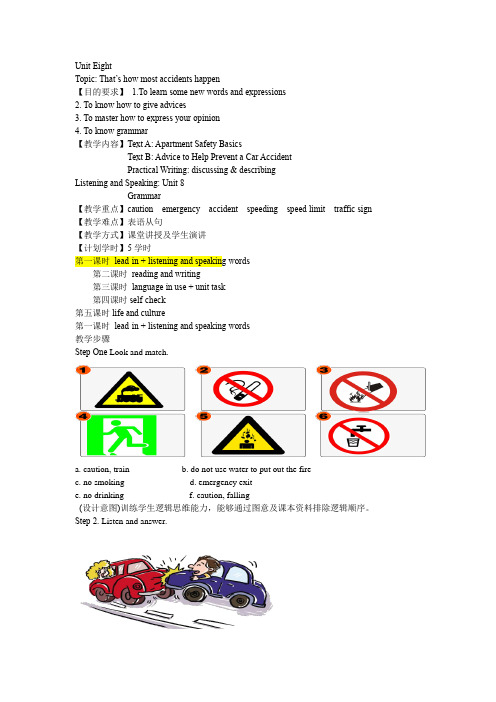
Unit EightTopic: That’s how most accidents happen【目的要求】1.To learn some new words and expressions2. To know how to give advices3. To master how to express your opinion4. To know grammar【教学内容】Text A: Apartment Safety BasicsText B: Advice to Help Prevent a Car AccidentPractical Writing: discussing & describingListening and Speaking: Unit 8Grammar【教学重点】caution emergency accident speeding speed limit traffic sign 【教学难点】表语从句【教学方式】课堂讲授及学生演讲【计划学时】5学时第一课时lead-in + listening and speaking words第二课时reading and writing第三课时language in use + unit task第四课时self-check第五课时life and culture第一课时lead-in + listening and speaking words教学步骤Step One Look and match.a. caution, trainb. do not use water to put out the firec. no smokingd. emergency exite. no drinkingf. caution, falling(设计意图)训练学生逻辑思维能力,能够通过图意及课本资料排除逻辑顺序。
Step 2. Listen and answer.1. What are the speakers talking about? They are talking about a traffic accident.Step 3. Discuss and practice.A: What are the causes of most car accidents?B: In my opinion, speeding is perhaps the main cause of car accidents.Step 4. Listen and answer.They are mainly talking about safety cautions.Step 4. Listen and tick.( ) 1. There was a car accident last night.( ) 2. The accident was caused by drunk-driving.( ) 3. Most car accidents are caused by over speeding.( ) 4. When you are sleepy, you may drive slowly.( ) 5. It is wrong to use mobile phone when driving.Step 5.Listen and underline.Step 6. Listen and complete1. Never drive _______________.Did you watch TV last night? No, I had to finish a report. What was on? There was a car accident in the city yesterday. Another one? What caused the accident this time? It is reported that the driver drank too much wine. Oh, no, drunk-driving again. It hasbecome a very serious problem now. Yeah, and there are more and more cars on the road today. That’s another problem I agree. I’ve just got my driver’s license and want to buy a new car. Linda: Ben:Linda: Ben: Linda: Ben: Linda: Ben: Good! But you must remember not to drive after drinking. Certainly. I will be careful. Still, I want to warn you. First, know the speed limit and don’t drive too fast. That I see. Any other suggestions? You should pay attention to the traffic lights and the traffic signs on the road.Yeah, I think that’s very important. Never drive when you are sleepy and remember not to use your mobile phone while dr Thank you for giving so much advice. Be safe! Linda: Ben:Linda: Ben: Linda: Ben: Linda:Ben: Linda: __________________________________________________2. Know _______________.3. Don’t drive _______________.4. Pay attention to _______________ and _______________.5. Never drive _____________________.6. Do not use ________________________________.Step 7. Discuss and match.1. The pan is on fire.2. The driver is drinking.3. The children are walking near the tallbuilding.4. There comes a bus.5. The boys are washing.a. Remember to turn off the tap.b. Do not use water to put out the fire.c. Caution, falling!d. Watch out!e. No driving after drinking.f. No walking when the lights are red.Step 8. Everyday English.1. Watch out for falling objects. 请注意坠物。
三一口语三级第1-8讲 讲义(完整版)

GESE - Grade 3 Unit 1This is My School.I. Words & Phrases方位: next to(紧挨着), beside(在…旁边), behind(在…后面), in front of(在…前面),under(在…下面), on(在…上面), in(在…里面)学校: classroom building(教学楼), gym(体育馆), playground(操场), basketball court(篮球场), library(图书馆), dining hall(食堂), gate(大门), auditorium(礼堂), dormitory building(宿舍楼), sports field(运动场), swimming pool(游泳池), slide(滑梯), swing(秋千), floor(楼层,地面), the first floor(一楼), the second floor(二楼), the third floor(三楼), teacher’s office(教师办公室), clinic(医务室), washroom(洗手间), computer room(机房), music room(音乐教室), library(图书馆), piano(钢琴), violin(小提琴)描述性: big / large(大), small / little(小), new(新的), old(旧的), beautiful(美丽的), 运动: sport(运动), sports instruments(运动器材), do sports(做运动), table tennis(乒乓球), badminton(羽毛球),其他: introduce(介绍), describe(描述), laptop(笔记本电脑), finger(手指), fist(拳头), calendar(日历),II. Key sentences (“”表示可替换)1. There’s a / an … in my school. / There’re … in my school.2. My school is very … and … (big / small, large, old / new, beautiful)3. We usually do sports in the playground.III. Q&A (“”表示可替换)1. – Is there a ... in your school? – Are there … in your school?– Yes, there is. / No, there isn’t. – Yes, there are. / No, there aren’t.2. – Where is the gym?– The gym / It is next to the playground.3. – What do you do in the gym?– I usually do sports in the gym.4. – Can you introduce the gym in your school?–The gym is very big and beautiful. There’re many sports instruments there. I usually play badminton there.5. – Can you introduce / describe your school?(or “Tell me something about your school.”)–My school is very big and beautiful. There’re a classroom building, a library, a dining hall, a gym, a playground and some basketball courts in my school. I always study and play there. I love my school very much.6. – Which floor is the washroom on? / Where is the washroom?– The washroom is on the first floor.7. – Is the library on the second floor?– Yes, it is. / No, it isn’t.8. – What’s in the library?– There are many books and bookshelves in the library.9. – What do you do in the library?– I read books in the library.10. – How many classroom buildings are there in your school?– There’re three classroom buildings in my school.GESE - Grade 3 Unit 2What Does Your Father Do?I. Words & Phrases职业: teacher, student, doctor, nurse(护士), worker(工人), singer(歌手), dancer(舞蹈演员), artist(艺术家/画家), writer(作家), editor(编辑), engineer(工程师), computer programmer(计算机编程员), hairdresser(理发师), shop assistant(店员), seller (售货员), clerk(职员), accountant(会计), manager(经理), general manager(总经理), president of the board(董事长), soldier(士兵), policeman(警察), lawyer(律师), farmer(农民), cook(厨师), waiter(男服务生), waitress(女服务生), scientist(科学家), driver(司机), pilot(飞行员), tour guide(导游), judge(法官), reporter(记者), housewife(家庭主妇), stewardess(空姐/女乘务员), secretary(秘书)家庭: family member(家庭成员), father, mother, sister(亲姐妹), brother(亲兄/弟), cousin(堂/表兄弟姐妹), grandpa, grandma, uncle(叔/舅/伯/姨父/姑父), aunt(姑/姨/婶/舅妈)场所: office(办公室), hospital(医院), school(学校), factory(工厂), company(公司), shop/store(商店), shopping mall(卖场), super market(超市), barber(理发店), TV station(电视台), newspaper office(报社)II. Q&A (“”表示可替换)1. – How many people are there in your family?– There’re … people in my family.2. – Who are they?– They’re my father, my mother, my… and me.3. – What does your father do? / What’s your father?– My father is an engineer.4. – Where does he work?– He works in an office.5. – Is he a doctor?– Yes, he is. / No, he’s a cook.6. – Does he work in a hospital?– Yes, he is. / No, he isn’t. He works in a restaurant.7. – What do your parents do?– My father is a … My mother is a …8. – Where do they work?– My father works in … My mother works in …9. – Are they very busy?– Yes, they are. / No, they aren’t.10. – How do they go to work?– My father goes to work by car. / My father drives to work.My mother goes to work by subway / by bus / by foot.GESE - Grade 3 Unit 3What’s the date today?I. Words & Phrases月份: January(Jan.), February(Feb.), March(Mar.), April(Apr.), May, June(Jun.), July(Jul.), August(Aug.), September(Sep.), October(Oct.), November(Nov.), December(Dec.)日期: date(日期), Jan. 25(Jan. the twenty-fifth / January the twenty-fifth / the twenty-fifth of January)时间: hour(小时), half an hour(半小时), quarter(15分钟;四分之一), minute(分钟), second(秒), am(上午), pm(下午)II. Q&A (“” 表示可替换)1. – How many seconds are there in a / one minute?–There’re 60 seconds in a minute.2. – How many minutes are there in an hour?– There’re 60 minutes in an hour.3. – How many hours are there in a day?– There’re 24 hours in a day.4. – How many days are there in January?– There’re 31 days in January.5. – How many months are there in a season?– There’re 4 months in a season.6. – How many seasons are there in a year?– There’re 4 seasons in a year.7. – How many months are there in a year?– There’re 12 months in a year.8. – What’s the date today? / What date is it today? (Feb. 14)– It’s February the fourteenth. / It’s the fourteenth of February.9. – What day is today? / What day is it today?– It’s Wednesday.10. – What time is it (now)?– It’s nine o’clock. (9:00)It’s nine twenty-four. (9:24)It’s nine fifteen. / It’s a quarter past nine. (9:15)It’s nine forty-five. / It’s a quarter to ten. (9:45)It’s nine thirty. / It’s half past nine. (9:30)It’s 8:15 am. / It’s 10:45 pm.GESE - Grade 3 Unit 4When do you go to school?I. Words & Phrases短语: wake up(醒来), get up, one’s(某人的), brush one’s teeth(刷牙), wash one’s face(洗脸), have breakfast(吃早饭), go to school(上学), have classes(上课), have lunch(吃午饭), do sports(做运动), go home, have dinner/supper(吃晚饭), do homework(做作业), watch TV(看电视), go to bed(睡觉)学科: subject(学科), Chinese(语文), math(数学), English(英语), dancing lesson(舞蹈课)其他: am(上午), pm(下午), at the weekend(周末) , at school(在学校), after school(放学后), at home(在家), once(一次), twice(两次), three times(三次) II. Q&A (“” 表示可替换;根据实际情况回答)1. – When do you get up in the morning? (when = what time)–I usually get up at six o’clock. Sometimes I get up at seven o’clock, because I have no lesson at the weekend.2. – When do you have breakfast?– I usually have breakfast at seven o’clock. Sometimes I have breakfast at half past seven, because I get up late.3. – What time do you go to school?– I go to school at 7:30.4. – What subjects do you have?– I have math, English, Chinese, PE, music, art and science. I like English best, because I like to speak English.5. – What do you usually do after school / in the evening?– I usually have dinner at six o’clock. Then I do my homework. SometimesI watch TV after diner.6. – Do you have any lessons at the weekend?– Yes, I have English lessons on Saturday and on Sunday I have a math lesson.–No, I don’t have any lessons on Saturday and Sunday, so I can play with my friends. I love my weekend.7. – What do you usually do at the weekend?–I have some lessons on Saturday and on Sunday I usually play basketball with my friends.8. – How often do you play basketball?– I play basketball twice a week.GESE - Grade 3 Unit 6What are they doing?I. Words & Phrases短语: write a letter(写信), do one’s homework, teach English, read books, watch TV, sweep the floor(扫地), clean the bedroom(打扫卧室), water the flowers(浇花), set the table(摆餐桌), listen to music, play soccer(踢足球), ride a bike, ride a horse(骑马), do exercises(锻炼、做操), fly a kite, play chess(下棋), play the violin(拉小提琴), play the piano(弹钢琴), play the drum(打鼓), play baseball(打棒球), play volleyball(打排球), climb the mountain(爬山)特殊的动词ing形式: take(taking), make(making), have(having), ride(riding), write(writing), dance(dancing), hike(hiking), set(setting), jog(jogging), run(running), swim(swimming),其他: hike(远足), fish(钓鱼)II. Q&A (根据实际情况回答)1. – What are you doing?– I’m watering the flowers.2. – What’s he doing?– He’s fishing.3. – What’s she doing?– She’s playing the violin.4. – What are they doing?– They’re playing volleyball.5. – Is he running?– Yes, he is.6. – Is she riding a bike?– No, she’s riding a horse.7. – What is Kate doing?– She’s hiking.8. – Is Mary playing a game?– No, she’s playing a drum.GESE - Grade 3 Unit 7What’s the weather like today?I. Words & Phrases天气:sunny(晴朗的), cloudy(多云的), windy(大风的), rainy(下雨的), raining(正在下雨), snowy(下雪的), snowing(正在下雪), foggy(雾天), stormy(暴风雨/雪天气), lightning(闪电,打闪), hailing(在下冰雹), cold(寒冷的), cool(凉爽的), warm(温暖的), hot(炎热的), wet(潮湿的), dry(干燥的), nice weather(好天气), bad weather(坏天气)其他:have a picnic(野餐), stay home(待在家), in the rain(在雨中), take a walk(散步), in general(总的来说), I’d rather… (我宁愿…)II. Q&A (“” 表示可替换)1. – Nice day, isn’t it? (天气不错,是吧?)Let’s go and have a picnic.– That’s a good idea. (好主意!)2. – What’s the weather like today? / How’s the weather today?– We have bad weather again. It’s cold and windy.3. – Is it snowing?– Yes, it is. / No. It’s raining.4. – What was the weather like yesterday?– It was foggy yesterday.5. – Was it cloudy yesterday?– Yes, it was. / No, it was snowy yesterday.6. – How many seasons are there in a year?– There’re four seasons in a year.7. – What’s the weather like here in spring?– It’s usually cold and dry here in spring.But in general, it’s getting warmer and warmer.8. – Is it cold in Beijing (or “here”) in summer?– No, it’s usually very hot and wet here in summer.9. – What do you like to do in winter?– I like to skate and make a snowman in winter.10. – Do you like to fly a kite in autumn?– Yes I do. / No. I like to … in autumn.11. – When can you make a snowman?– I can make it in winter.12. – When is winter?– Winter is (lasting) from December to February here in Beijing.13. – Do you like to take a walk on rainy days?– Yes, I do. / No. I’d rather stay at home on rainy days.14. – What do you want to do on rainy days?– I want to stay at home with my parents.15. – What do you like to do on sunny days?– I like to go outside and play with my friends.GESE - Grade 3 Unit 8Where were you yesterday morning?I. Words & PhrasesBe动词: was(“be”过去式单数), were(“be”过去式复数.)其他: schedule(日程表); sunny, rainy, snowy(雪天), windy, cloudy, foggy(雾天) 场所: at home(在家), at school(在学校上课), in the garden(在花园), in the playground(在操场), in the hospital(在医院), in the store(在商店), in the bank(在银行), in the park(在公园)II. Q&A (“” 表示可替换)1. – Where were you yesterday?– I was at school (yesterday).2. – Were you at home the day before yesterday?– Yes, I was. / No, I was in the park.3. – Where were the pencils this morning?– The pencils were on the sofa this morning.4. – What was the weather like yesterday?– It was foggy yesterday.5. – Was it cloudy yesterday?– Yes, it was. / No, it was snowy yesterday.6. – What day was it yesterday?– It was Friday (yesterday).7. – Was it Saturday yesterday?– Yes, it was. / No, it was Sunday (yesterday).8. – Wasn’t it Wednesday yesterday?– No. It was Thursday yesterday.9. – What was the date yesterday?– It was Jan. 5 (yesterday).10. – When is your birthday?– My birthday is on February 18.GESE - Grade 3 Unit 9How can I get to the library?I. Words & Phrases问路:turn right(右转), turn left(左转), on the right / on one’s right(在右边), on the left / on one’s left(在左边), walk along / go along / go down(沿...一直走), walk across / go across(穿过...)其他:turning(转弯处), crossing(十字路口), traffic lights(交通灯), zebra crossing(斑马线), street(大街), road(路)地标:library(图书馆), classroom building(教学楼), dining-hall(食堂), gym(体育馆), swimming pool(游泳池), store(商店),department store(百货商场), bookstore(书店), bank(银行), park, cinema(电影院), bus stop(汽车站), hotel / inn(酒店,宾馆), post office(邮局), theatre(剧院), supermarket(超级市场), restaurant(餐馆), subway station(地铁站), railway station(火车站), police station(警察局), university(大学), bakery(面包房)II. Q&A (“” 表示可替换)1. – Excuse me. How can I get to the classroom building?– Walk along this road and turn left at the second turning.2. – Excuse me. Do you know how to get to the theatre?– Of course. Go down this street and take the third crossing on the right.Walk along. The theatre is on your left.3. – Excuse me. Could you tell me the way to the restaurant?– Sure. Go along this road. Get to Street 1 and turn left.Then you can see the restaurant on your right.4. – Excuse me. Do you know the way to the railway station?– Yes. Go straight ahead for about 100 meters.Then you will find it on your left. You won’t miss it.。
catti3级课程培训讲义

二、词汇、句型口译1、词汇口译领导换届 the change of state leadership抗击非典疫症 the combat against SARS 上任 to take office 里程碑landmark惊心动魄 soul-stirring 艰苦卓绝arduous坚定不移steadfast 振兴经济 to revitalize the economy勤劳、勇敢和智能 the assiduity, courage and wisdom改善民主 improve people's livelihood改善施政 improve standards of governance 珠江三角洲 the Pearl River Delta 民族振兴 national revival义不容辞 unshirkable 干杯 cheers欢聚一堂 join (together) 突如其来 No sooner than; come all of a sudden 小康 well-off; well-to-do; comfortably off紓解民困alleviate people's hardships 化解民怨redress public grievances 凝聚民心 improve social solidarity经济转型 economic transformation/restructuring主人翁姿态 role of master 繁荣昌盛thriving prosperity抓紧/加快/推动 step up; speed up; promote香港个人游 Individual Visits to HK 稳定楼市stabilize property market财政政策fiscal policy2、句型口译我们为此感到无比骄傲和自豪。
Our pride and joy in this accomplishment is .三、口译技巧1.英汉语序调整英语状语可前可后,汉语状语一般前置。
高教版中职英语(基础模块 第3册)Unit 8《That’s how most accidents happen》ppt课件3
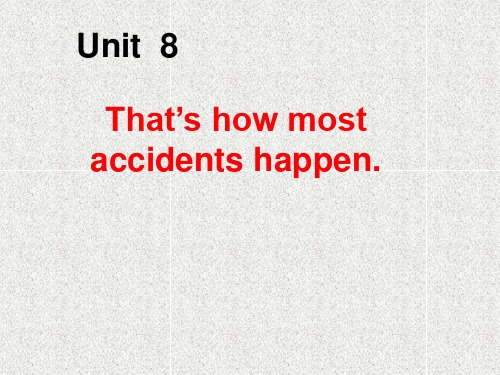
no entry
no smoking
caution animals
caution train
emergency exit
caution falling
Discuቤተ መጻሕፍቲ ባይዱs
Look at the following pictures, discuss what are the causes of most car accidents.
Unit 8 That’s how most accidents happen.
Guess
Can you guess the meaning of these pictures?
turn left
do not use water to put out the fire
no drinking
speed limit
Listen and answer.
They are mainly talking about
safety cautions.
Listen and tick.
(
( ( ( (
) 1. There was a car accident last night.
) 2. The accident was caused by drunk-driving. ) 3. Most car accidents are caused by over
Act and practice.
A: B: A: B: A:
Hello, Jack, long time no see. You know, I have just got the driving license. Oh, congratulations. Thank you. But could you give me some advice on driving? Well, first, … … , then, … … . I see. Any other suggestions?
全国公共英语三级 PPT课件
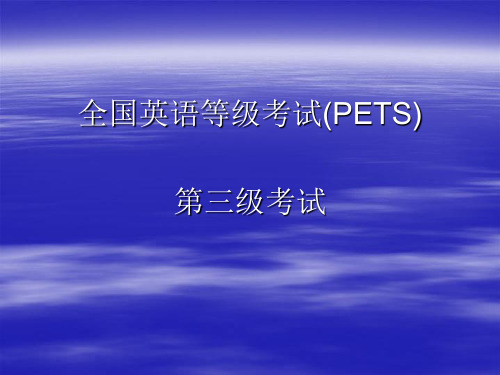
笔试试卷: 有四个组成部分:听力、英语知识运用、阅 读理解和写作。
口试试卷: 分三节考查学生的口语交际能力。
2、关于考试指导语和题目用语
在PETS第三级考试中,笔试、口试的指导 语均为英语。写作题中所提供的引导性材料 可能会涉及少量的中文。
3、关于答题卡和登分卡的使用
笔试中,使用的是用于光电阅读器评分的答题卡1 和用于人工阅卷的答题卡2。
7、问原因、问目的,如: Why is the man late? Why did the man repair the car by himself?
听力
8、问钟点,如: When did the man finally start?
9、问日期,如: When will he be paid?
10、问对话者某一方的身份或对话人之间的关 系,如: who is the man ?
听力
三、解题技巧 1、学会放过有两种听不懂的情况:
(1)、太专注于思索刚听到的一句话,而无法 听到下一句话。
(2)、不能足够迅速地把所有听到的整理一 清而遗漏了整段话。 学会放过就是要放过那些暂时听不明白的词 或句子,接着听下面的的话往往会得到意想 不到的惊喜的效果。
听力
2、把握主题 体现段落中心意思的句子叫主题句,常常放在句
在一次考试中没有获得《全国英语等级考试合 格证书》而单项考试合格的考生,将由教育部考试 中心核发相应合格项目的单项成绩合格证。
(二)笔试试卷内容与结构
1、听力
该部分由A、B两节组成。
A节(10题):考查考生的理解能力。要求考生 根据所听到的10段简短的对话(总长约400词,总 持续时间约3’30’’),从每题所给的4个选择项中选出最 佳选项。每题有15秒答题时间(5秒用作听前读题, 10秒用作听后答题。每段录音材料只播放一遍。
高教版公共英语3级精讲班讲义
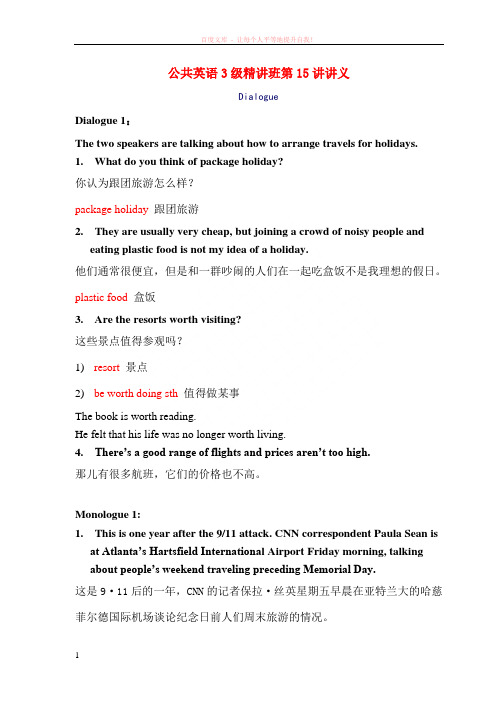
公共英语3级精讲班第15讲讲义DialogueDialogue 1:The two speakers are talking about how to arrange travels for holidays.1.What do you think of package holiday?你认为跟团旅游怎么样?package holiday跟团旅游2.They are usually very cheap, but joining a crowd of noisy people andeating plastic food is not my idea of a holiday.他们通常很便宜,但是和一群吵闹的人们在一起吃盒饭不是我理想的假日。
plastic food 盒饭3.Are the resorts worth visiting?这些景点值得参观吗?1)resort 景点2)be worth doing sth 值得做某事The book is worth reading.He felt that his life was no longer worth living.4.There’s a good range of flights and prices aren’t too high.那儿有很多航班,它们的价格也不高。
Monologue 1:1.This is one year after the 9/11 attack. CNN correspondent Paula Sean isat Atlanta’s Hartsfield Internationa l Airport Friday morning, talking about people’s weekend traveling preceding Memorial Day.这是9·11后的一年,CNN的记者保拉·丝英星期五早晨在亚特兰大的哈慈菲尔德国际机场谈论纪念日前人们周末旅游的情况。
- 1、下载文档前请自行甄别文档内容的完整性,平台不提供额外的编辑、内容补充、找答案等附加服务。
- 2、"仅部分预览"的文档,不可在线预览部分如存在完整性等问题,可反馈申请退款(可完整预览的文档不适用该条件!)。
- 3、如文档侵犯您的权益,请联系客服反馈,我们会尽快为您处理(人工客服工作时间:9:00-18:30)。
公共英语3级精讲班第8讲讲义DialogueDialogue 1:Karen has just had her house redecorated. Her friend Jenny is visiting her and they are talking about the decoration.1. Karen has just had her house redecorated. 凯伦刚刚装修过房子。
have sth done have the letter typed have the bike repaired have the paper written2. But how did you two find the time to fix it up so nicely? 你们俩是如何找到时间把家装饰的这么漂亮的呢? fix up 修理、重新装饰或改装某物 He fixed up the cottage before they moved in.3. The architect and Tom put their heads together to discuss what we wanted and what was possib le. 建筑师和汤姆交换意见讨论我们需要什么和什么是可能的。
put one’s head together 交流思想,交流意见I’m sure that we can solve the problem if we all put our heads together.4. After a few meetings, they came up with some super ideas that everybody agreed with. 开完会后,他们想到了一些大家都同意的好主意。
come up with找到或提出方法She came up with a new idea for increasing sales.5. We were able to make do with the materials we already have. 我们能够用已经有的材料凑活着用。
make do with 用某事勉强应付,将就,凑活We were in a hurry so we had to make do with a quick snack.6. It’s funny how people can find solution after they kick something around for a while.kick sth around/round 随便商谈,非正式的讨论(计划,想法等)We’ll kick some ideas around and make a decision tomorrow.Dialogue 2:Meng Di is a pro at playing videogames. He is now teaching Su Ling, his friend, how to play a videogame on his home computer.1. Your job is to move your gun underneath them before the bombs hit the grounds. 你的工作是在炸弹落地爆炸之前移动它们下面的手枪。
underneath 在---下面 1) below 低于That part of the country is below sea level. 2) under 垂直向下 We rested under a big tree. 3) beneath (文学作品)The heroine of the opera is a girl who defying the opposition of her parents courageously married ben eath her.4) underneath 完全隐蔽或掩盖起来I am wearing a fur-lined vest underneath this coat.2. If you hold it down, it loads bullets automatically and fires continuously. 如果你把它按下,子弹就会自动持续的射出。
hold sth down 使某事物保持低水平,压制住某物 The rate of inflation must be held down.3. For now I’d like to concentrate on getting the bet score ever on this game. 现在我想集中精力保持这项游戏的最高分。
concentrate on 集中精力做某事I can’t concentrate on my studies with all the noise going on. We must concentrate our efforts on improving education. 6. I think you are hooked. 我想你已经上瘾了。
be hooked (on sth)She is completely hooked on the idea of camping holiday.Monologue 1Sara is specialist of domestic science. She is now talking to new parents about how to ensure theirchildren’s safety at home.1. Although , some of these come with childproof safety caps, many times this is not enough to protec t the child.虽然有些有对儿童安全的安全盖,这经常并不足以保护儿童。
2. These are available at most drug and department stores, and will prevent the child from putting his fingers into the sockets.这些在大多数的药店和百货商店都能买到,会防止孩子把手指放进插座里。
1)available 可用的或可得到的 Tickets are available at the box office This was the only available room.2) prevent sb from doing sth 阻止某人做某事 Nobody can prevent us from getting married.We should try our best to prevent the disease from spreading.3. No matter how busy you are, always take time out to check that your child hasn’t gotten hold of so mething that could hurt him.不管你有多忙,你都要抽时间检查你的孩子没有抓到可以伤害到他的东西。
take time out to do sth 拿出时间做某事 get/catch/grab/seize/take hold of 抓住某物 I threw the rope and he caught hold of it.Monologue 2:1. I’ve been married for 12 years, but quit my job and took up housekeeping the year after my marriage.我已经结婚12年了,但是我结婚后就辞职照顾家庭了。
take up doing sth 开始做某事2. Daily household chores keep me on my toes; I am delighted all day long. 日常家庭生活使我非常有活力,我每天都非常高兴。
on one’s toe 准备行动的,警觉的The constant threat of danger kept us all on our toes.3. Humming like a bee around the house, I’ve never had the feeling of boredom and inanity.象蜜蜂一样的忙碌,我从来没有感觉到厌倦和空虚。
humming like a bee 象蜜蜂一样的忙碌(现在分词短语作伴随状语)4. While I see my beloved walking out of the house beamingly and briskly out of my sight, my heartblooms with joy and satisfaction.当我看到我的爱人愉快的走出房子生气勃勃的消失在我的视线里,我的心充满了快乐与满足。
see sb doing sth bloom with sth 1)草木茂盛The garden is blooming with spring flowers. 2)由于某种原因处于健康的状态 They were blooming with health and happiness.5. Besides, he always has his lunch in a neglected way at his workplace. 他总是在工作地方随便的吃饭in a neglected way 不在意,不留心,马马乎乎PassagePassage:The following passage talks about the comfortable life of Mrs. Chambers after her retirement. 1. The is land farm had been owned by the Chambers family for many years, passing on from father to son.这个岛上的农场从祖上传下来属于乾博家族已经很多年了。
be owned by 属于---pass on from --- to --- 从---传下来2. But it was only old Tom MaAleer, frightening her for fun. 只有老汤姆·麦勒吓唬她以此寻求乐趣。
